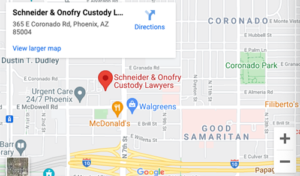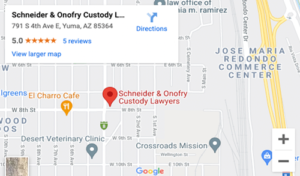A restraining order, or an order of protection, is designed to protect victims of physical abuse, threats, and domestic violence. An order of protection can be granted by the court if the person who has physically abused you or threatened you is a spouse, a person with whom you have lived with in the past (or currently live with), or is a person with whom you are romantically or sexually involved. If you are pregnant with the person’s child or if you have a child in common, you may also be able to seek an order of protection against an abusive or threatening person in your life. Orders of protection can also be sought against family members or your spouse’s family members. If a person who is threatening or harassing you is a friend of your former partner or spouse, you may still be able to get an injunction against harassment, which can offer you similar protections to an order of protection. Arizona courts offer a range of options by which victims of domestic violence and abuse can seek protection. If you need assistance with seeking a restraining order during your divorce, contact Schneider & Onofry, P.C., a Yuma, Arizona divorce lawyer today.
The time when victims of domestic violence are most at risk of injury or death is when they decide to leave their abusive partners. If you are considering divorcing a partner who has been abusive, consider seeking help. One way that you can protect yourself and your children is by seeking an order of protection. A restraining order can give you and your children recourse if your former partner abuses you with harassment and violence. It can require that your abusive partner move out of your home and permit you to call the police if your former partner tries to contact you. Having an order of protection on file can also protect your rights when the time comes to make child custody decisions. If you are concerned for the safety of your children following your divorce, the divorce attorneys at Schneider & Onofry, P.C. in Yuma, Arizona may be able to help you take steps to protect your rights and protect your children.
What Kind of Actions Can Result in a Restraining Order?
A restraining order or order of protection can be sought in several circumstances. If you or your children were victims of assault, domestic violence, or kidnapping, you may have the right to seek a restraining order. There are other actions that can also result in a restraining order. There are many different types of violence and the violence doesn’t have to be physical for you to have the right to seek a restraining order. Harassment, stalking, threats, intimidation, video taping you or your children without your permission, or endangering you or your children, are all actions that can permit you to file a restraining order. If a person has damaged your property, you may also have the right to file an order of protection.
Domestic violence can take many forms. It can include physical abuse, emotional abuse, and financial abuse. Many victims may not realize that they are in an abusive relationship until physical or sexual violence occurs. However, a victim might have been suffering from other, subtle abusive acts that may not have included physical violence. When the situation involves physical violence, often the abusive partner has used a variety of tactics to keep the victim in the abusive situation. These tactics can include controlling where a person goes, who a person sees, and limiting her contact with others. It can include minimizing her concerns and shifting responsibility for abusive behavior. Abuse can include months or weeks of put-downs, name-calling, and guilt-tripping. It can involve economic abuse that can include controlling a person’s money or access to money. Abusive situations can also arise when an abusive partner isolates a person from friends or family. These are just some of the symptoms and signs of abuse. If you are trying to leave a relationship where you are frightened for your safety, you do not have to navigate this process alone. Leaving an abusive situation can require a great deal of courage. It can be helpful to plan ahead, by having a safety plan in place and possibly by seeking an order of protection. Schneider & Onofry, P.C. are family law attorneys in Yuma, Arizona who may be able to help you seek an order of protection if you are in the process of leaving an abusive relationship.
What Can an Order of Protection Do?
An order of protection can make it illegal for your former partner to try to see you at home, school, or work. It can make it illegal for your former partner to contact you. However, there are things that a restraining order cannot do. If your partner is a high-risk to you or your children, a restraining order won’t incarcerate the individual, meaning that some families need to seek shelter or find a safe place where a former partner cannot find them. While you can always call the police if your former spouse tries to contact you or visits you at home, work, or school, a restraining order is a legal document, and not in itself physical protection from a person who is a danger to themselves or others. An order of protection in itself also won’t change your child custody agreement or parenting plan if you already have one in place. If you are concerned for your children’s safety, you may want to speak to the family law attorneys at Schneider & Onofry, P.C. in Yuma, Arizona today. An order of protection on a person’s record might be considered by the court to be a significant change in circumstances and the divorce lawyers at Schneider & Onofry, P.C. may be able to help you seek modifications to your parenting plan.
If you have questions about how to file a restraining order in Yuma, Arizona, and whether a restraining order is appropriate in your situation, consider speaking to the divorce lawyers at Schneider & Onofry, P.C. Our firm can help you understand your rights and assist you with the process. Finally, if you are concerned for your safety or for the safety of others, reach out to the National Domestic Violence Hotline. The phone number is 1-800-799-SAFE. The hotline offers free counseling services to individuals facing abuse or domestic violence.















